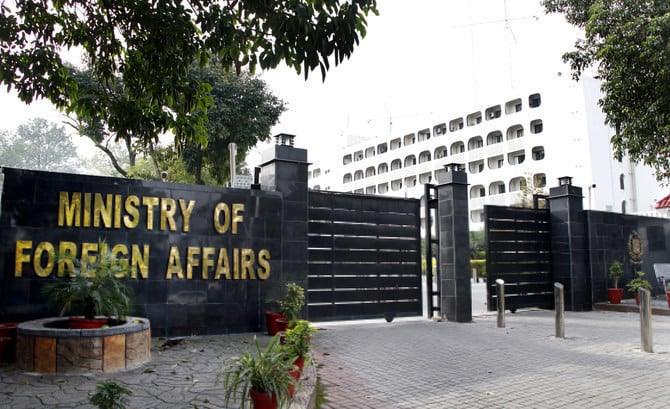On Thursday, Pakistan condemned strong comments from Indian Defense Minister Rajnath Singh on supervision of Pakistan’s nuclear Arsenal and called them “irresponsible and misleading.”
The declaration came after Indian Defense Minister Rajnath Singh claimed that Pakistan’s nuclear weapons should be placed under the surveillance of the International Atomic Energy Agency (IAEA), the united nuclear watchdog.
In response to the statement, spokesman for the Foreign Office Shafqat Ali Khan rejected the comments and described them as reflective of “in -depth uncertainty and frustration” over Pakistan’s conventional military capabilities, which he said were sufficient to deter Indian aggression without dependence on nuclear threats.
Khan also criticized Rajnath Singh’s understanding of international nuclear supervision mechanisms and said his comments demonstrated “Ignorance of Mandate and Responsibility” for a specialized UN agency like IAEA.
The Fo spokesman raised concerns about India’s track record in nuclear security, referring to several events of theft and illegal possession of radioactive material in recent years.
He referred to specific events, including a reported theft from the Bhabha Atomic Research Center (BARC) and the seizure of Californium, a very radioactive substance, in Dehradun.
“Just last year, five people with a radioactive unit allegedly stolen from the Bhabha Atomic Research Center (Barc) were found in Dehradun, India.”
“These events suggest the existence of a black market for sensitive materials with double use in India,” said the Fo-spokesman, calling on the international community and IAEA to investigate the matter thoroughly.
The latest escalation between Pakistan and India began on April 22 when an attack in the IIOJK Resort city of Pahagam killed 26 people. India immediately accused Pakistan of the incident, despite having provided no public proof.
In response, India took on a number of hostile actions the next day of April 23, including the suspension of the 65-year-old Indus Waters Treaty (IWT), which canceled Visa for Pakistani citizens, closes the Wagah-Attari border transition, ordered the shutdown of Pakistan High Commission in New Delhi and the reduction of diplomatic staff at each other’s amount.
Pakistan strongly rejected the accusation and did not call it substantiated, but took mutual measures through his National Security Committee (NSC). These included stopping trade in India, ending Pakistani airspace to Indian aircraft and other recesses.
Tensions further escalated in the early hours of May 7, when missile strikes hit six cities in Punjab and Azad Jammu and Kashmir (AJK), destroy a mosque and kill dozens of civilians, including women, children and the elderly.
In a rapid military reaction, Pakistan’s armed forces shot Indian war plane, including three Rafale jet aircraft, which is largely considered an important asset to the Indian Air Force. Over the following two days, India launched waves of Israeli made drones, which were also neutralized by Pakistan’s military.
The confrontation intensified again in the early hours of May 10 when India targeted several Pakistani Airbases with missile attacks. In contrast, Pakistan Operation launched Bunyan-Un-Marsoos, which damaged Indian military installations, including missile storage sites, airbases and other strategic goals.
On Saturday night, US President Donald Trump announced that a ceasefire had reached after an intense diplomatic effort overnight. Minutes later, the agreement was confirmed separately by Pakistan’s Foreign Minister Ishaq Dar and the Indian Foreign Secretary.



